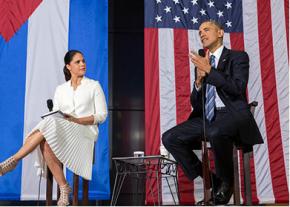Cuba deserves the apology, not U.S. business
Barack Obama's challenge to Cuba over its record on human rights is hypocritical, to say the least, writes Irish Times columnist .
I WONDER if President Obama put in a good word for the Lanskys during his visit to Cuba. The family wants its hotel back. Says spokesman Gary Rapoport: "It was through my grandfather's hard work that the hotel was built. By rights it should be our property."
The Hotel Riviera epitomized the glamour of an era long gone. Its casino was among the hottest of Havana hotspots, its guest list a roll call of the celebrities of the age--Marlon Brando, Ava Gardner, Marlene Dietrich, Gary Cooper, Errol Flynn, Buster Keaton and Rocky Marciano, as well as figures such as Winston Churchill. The hotel was run by the Mob. Meyer Lansky was the Mob's accountant. He had a mutually enriching relationship with dictator Fulgencio Batista, but was to lose everything when Batista bolted for the airport on New Year's Day 1959 as Castro's guerrillas exulted into the city.
Meyer was himself a celebrity gangster, represented in The Godfather II as Hyman Roth, bookkeeper and bagman for Vito Corleone. His real-life grandson now recalls: "Innocent people may have been killed now and then, but not like the crimes of today. That is why my grandfather's era of crime is so popular. They were like gentlemen killers and they dressed nice."

It's arguable Meyer's role in Cuba was no more damaging than that of the operators of mines, sugar plantations or refineries--Coca Cola, Exxon, etc.--respectable enterprises that had ridden roughshod over Cuban rights until Castro put a halt to their gallop, and whose compensation claims are now among 7,000 submitted to the U.S. government for negotiation as an element in the "normalization" process.
It was in retaliation for the seizure of U.S. property that the blockade of Cuba was first imposed. It was not a denial of human rights but of property rights that incurred Washington's wrath.
The strength of the compensation lobby shouldn't be underestimated. The nationalization of U.S. assets has been estimated in the Inter-American Law Review as the "largest uncompensated taking of American property by a foreign government in history." Both Republican and Democratic members of Congress have deemed it an issue needing resolution before tentative détente can develop into friendly relations. The Lanskys won't win the $70 million they say they are owed, but they'll get something.
THAT THE overthrow of the alliance of the Batista regime and U.S. freebooter capitalism can still be seen by some as an illegitimate act that must even now be set to rights says a lot about the historical blindness and sheer arrogance of successive Washington administrations: The cheek of a small country cocking a snoot at the indispensable nation!
Obama didn't touch down in Havana with an apology in his pocket for the U.S. having first slathered Cuba in sleaze, organized an invasion by far-right desperadoes, made at least five attempts on Fidel Castro's life, imposed a blockade in an effort to impoverish the country into submission and erected an internment camp on its soil where perceived enemies of the U.S. could be tortured, some to death. A brief "Sorry about that," might have been an appropriate opener. But no. Obama wanted to challenge Cuba's human rights record instead.
Raul Castro got his retaliation in first, with a reminder that the human rights to health care and education are better realized in Cuba than across the straits in Florida. He might have added there is no prisoner on death row in Cuba, in contrast to the droves awaiting death in the privatized prison cells of the U.S. system. Or that, in contrast to the dismaying drift of events in the U.S., Cuba has one of the most liberal abortion laws and one of the lowest rates of infant mortality in the world.
He might have remarked that if Cuba were a satrap state in the Middle East rather than an island in the Caribbean, he could chop the heads off as many political opponents as he liked without Obama uttering a syllable of concern.
None of this is to present Castro's Cuba as a sepia-toned paradise. Down through the years, the tendency of many on the left to swamp any criticism of the latest chosen land in a gush of sentimentality--Cuba is by no means the first example--has served no progressive purpose. Hitching hopes of socialist advance to the fate of a faraway country idealized out of all recognition has served as a comforting alternative to the slog of trying to make a revolution in the place where you actually are.
But there's a balance of political morality to be made in the meantime, and the weight of morality is on Cuba's side.
While we wait for an updated version of Meyer Lansky to saunter into his nostalgia-themed Havana casino, just one more time: Cuba si! Yanqui no!
First published in The Irish Times.


